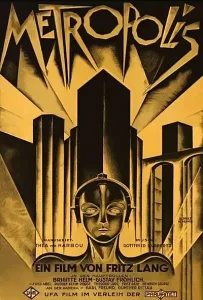Future Shock! How Fritz Lang's 'Metropolis' (1927) Built a Dystopian Vision That Still Towers Over Cinema!
Metropolis
(Germany, 1927, Fritz Lang, 153 minutes)
In the roaring, revolutionary decade of the 1920s, as Germany grappled with the aftermath of World War I and the vibrant, often chaotic, cultural ferment of the Weimar Republic, filmmakers pushed the boundaries of visual storytelling like never before. Amidst this artistic explosion, Fritz Lang emerged as a cinematic titan, a master of German Expressionism whose monumental vision redefined epic filmmaking. Metropolis (1927) is not merely a film; it is a towering, prophetic masterpiece, an astonishing feat of production design and special effects that envisioned a dystopian future with chilling clarity. It stands as a foundational text in science fiction cinema, influencing everything from Blade Runner to Star Wars, and remains one of the most expensive silent films ever made. Its grand scale, profound social commentary, and groundbreaking visual language cemented Lang's legacy as a visionary and secured its place as an enduring, utterly essential cult classic.
The film plunges us into a technologically advanced, hierarchical city of the future – Metropolis – where the opulent, gleaming skyscrapers of the wealthy elite literally tower over the bleak, subterranean world of the exploited working class. Freder Fredersen (Gustav Fröhlich), the idealistic son of the city's ruthless master, Joh Fredersen (Alfred Abel), descends into the workers' realm and falls in love with Maria (Brigitte Helm), a compassionate leader who preaches peace and unity. When Maria is kidnapped by the mad scientist Rotwang (Rudolf Klein-Rogge) and replaced by a mesmerizing, destructive robot duplicate, the city is plunged into chaos, leading to a workers' rebellion and a climactic struggle for the soul of Metropolis. Lang's direction is a masterclass in visual storytelling, utilizing colossal, Art Deco-inspired sets, thousands of extras, and pioneering special effects (including the Schüfftan process) to create a breathtaking, nightmarish vision of class warfare, technology run amok, and the eternal search for humanity amidst the machines.
Director: Fritz Lang.
Cast: Brigitte Helm as Maria / The Machine-Man, Gustav Fröhlich as Freder Fredersen, Alfred Abel as Joh Fredersen, and Rudolf Klein-Rogge as Rotwang.
Special Info/Trivia: Metropolis is widely considered a masterpiece of German Expressionist cinema and a seminal work of science fiction. It was the most expensive silent film ever made at the time of its production, with a budget that nearly bankrupted UFA studios. The film employed groundbreaking special effects, including the Schüfftan process, which allowed actors to appear to interact with miniature sets. Its original cut was severely cut and edited for decades, with a near-complete version being rediscovered and restored in 2010. The character of the robot Maria is one of the most iconic figures in cinematic history. The screenplay was co-written by Thea von Harbou, Lang's wife and frequent collaborator.

